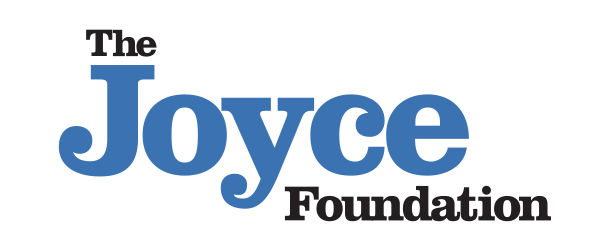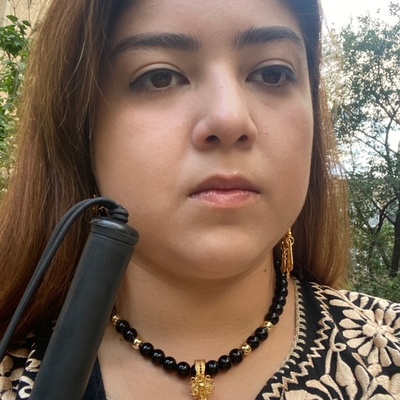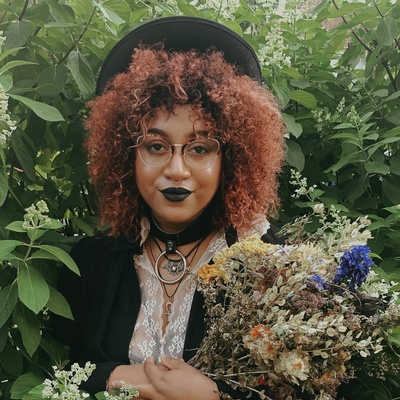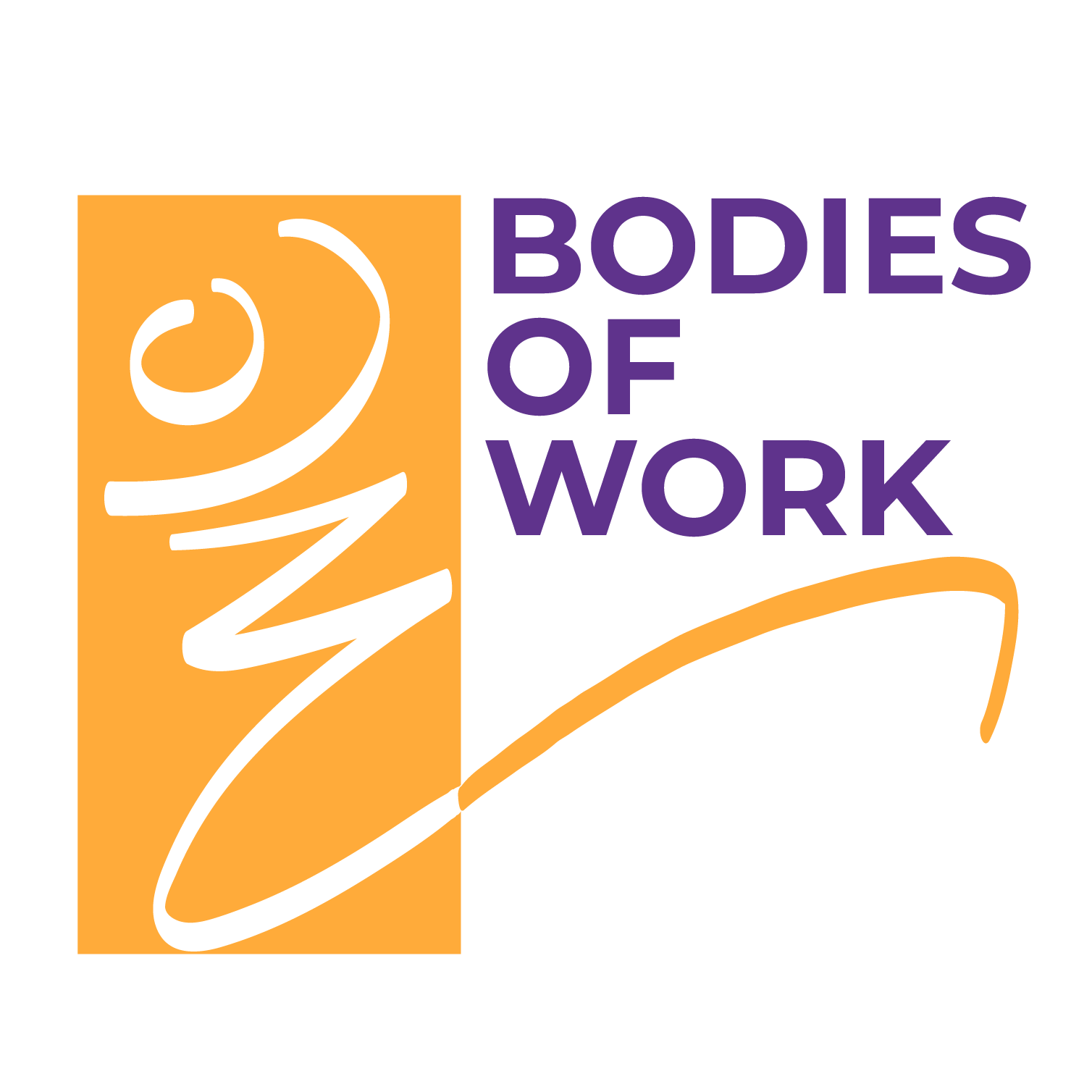Punk Cripistemologies
Fall 2023
Multidisciplinary artist and disability advocate Reveca Torres talks with singer/songwriter Stephanie Alma and comics artist/illustrator Bianca Xunise, who both bring their experiences from the 3Arts/Bodies of Work Residency Program to the forefront.
This is a transcript of the closed captions from the video conversation.
Reveca Torres: Hi, my name is Reveca Torres, I am a multidisciplinary artist and disability advocate. I am also the founder of Backbones, a nonprofit that supports and connects people with spinal cord injuries. I'm really glad to be here today with two artists, Stephanie Alma and Bianca Xunise, who recently participated in the 3Arts/Bodies of Work Residency Program. As a fellow alum from that program myself, I'll be leading a conversation with them about their work, their experiences in the residency, and the ways they situate themselves within the disability culture community. This conversation is part of a series called the Disability Culture Leadership Initiative, led by 3Arts in partnership with Bodies of Work. Special thanks to the Mayor's Office for People with Disabilities, including Commissioner Rachel Arfa and the Central West Community Center here in Chicago which is one of the outposts operated by the Mayor's Office and where we're filming today.
Stephanie Alma is a singer, songwriter, and producer interested in the sounds of disability identity and self-awareness through formal and informal vocal expression. Bianca Xunise is an illustrator and cartoonist who has published work in national outlets, often focusing on autobiographical stories about identity and social justice. Thank you both.
To get us started, in your own words, can you each take a moment and tell us a little bit about your work? Describe your art.
Bianca Xunise: I focus on combining writing and illustration, which, like, the classic term to that is comics. A lot of those stories focus on a lot of my identities, and the reason why I actually started creating comics was because I wanted to see more people who looked like me represented in the media. And, to not only put out myself and be vulnerable with myself to be like, you deserve to exist and you have a right to be here, but to also normalize who I am in a way that these stories that I put out are often relatable.
Bianca Xunise: They're often autobiographical and I hope that my audience connects with this work in a way that we can kind of almost remove the identities and the boxes that we check, and that we can see that we're all on this spaceship together, you know, just having the same sort of highs and lows and emotions.
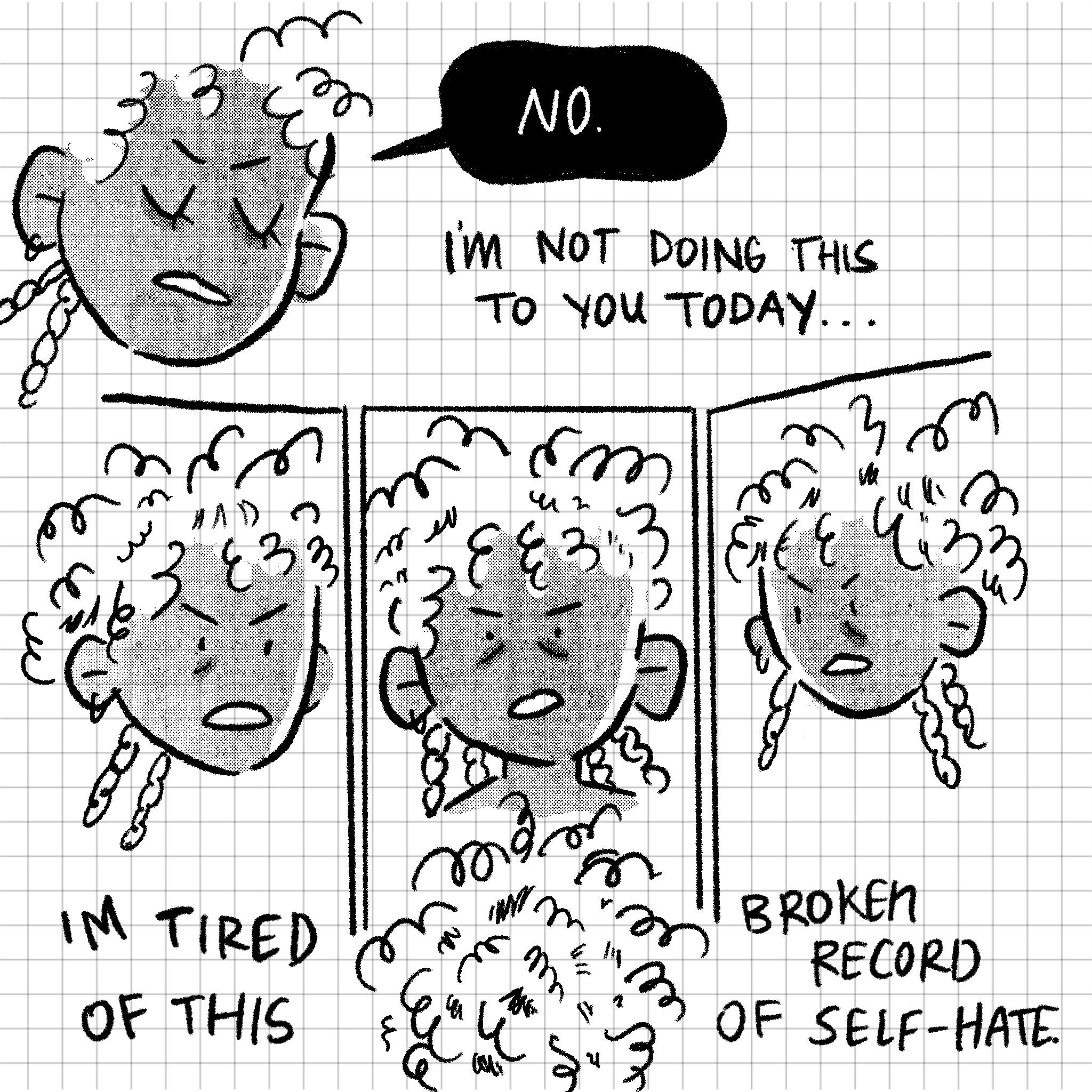 Morning Rumination on Instagram
Morning Rumination on Instagram
Stephanie Alma: I connect to that a lot already. So I write songs, I compose music. Right now I'm in a band that's called Raro which actually means strange or weird in Spanish, and for me, that name was derived from my place in the world.
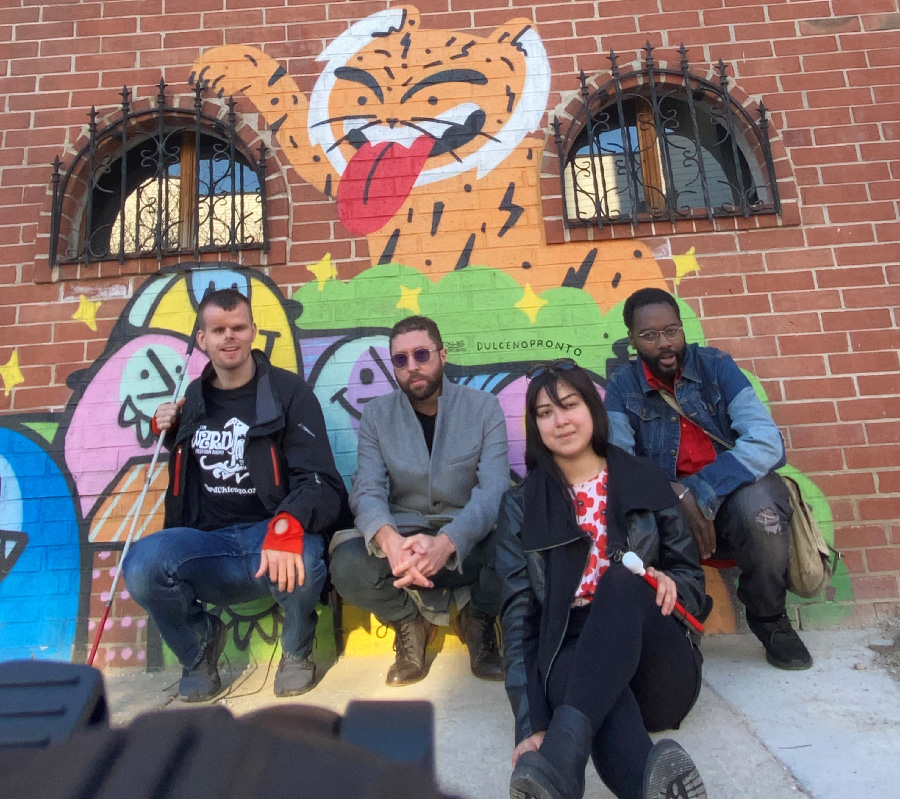 Raro Band Photo
Raro Band Photo
Stephanie Alma: I do have a rare disability and my identity, as a whole I always do feel like in between two worlds. And so most of my songwriting, my poetry, is telling that story and also telling life lessons, and it's a way for me to spread, I guess you can say, remedies or ways that I have learned have worked for me, moving through the world, and lessons that took me several years to learn.
Stephanie Alma: I share that through a 3 or sometimes 7 minute piece. Yeah, they can be pretty long, I try not to limit the ideas that I'm having and that's why I do like informal and formal vocal expression. So I do connect a lot with your work and your openness to telling your story. That's something I'm still working on, how to also safely tell my story, so for myself and for others, because some topics can be pretty heavy. But that comes from other artists and seeing what they're doing and seeing like, oh, ok I feel comfortable in this work, so maybe this is also helping me learn more who I am and I hope that I can do that for others as well that are moving through the world with rare disabilities and somewhat confusing identities sometimes.
Reveca Torres: So you each participated in the 3Arts/Bodies of Work Residency Program, and I did as well. It's a really customized program where Deaf and disabled artists can design their projects that they're working on, you can connect with other artists, scholars, mentors. You can conduct your research or make new work. So I'd love to hear from you. Can you talk a little bit about what you got out of this program?
Bianca Xunise: Yeah, it's very layered because there's so many different things coming out of this program that I didn't even expect to receive. I kind of went into it with no expectations. When I got approached for it, I was like this sounds really cool and almost like, too good to be true. Like, really? You want to just offer me comfort and just be like, hey I support you like no strings attached? Just, we're here to be supportive. It was like okay cuz I was finishing my debut graphic novel and so things would just sort of blow up in my face. And I'm having this learning experience and it was great to have this community. It was also great to have this opportunity to admit things to myself that I often don't really talk about and how can I be more vulnerable and sharing.
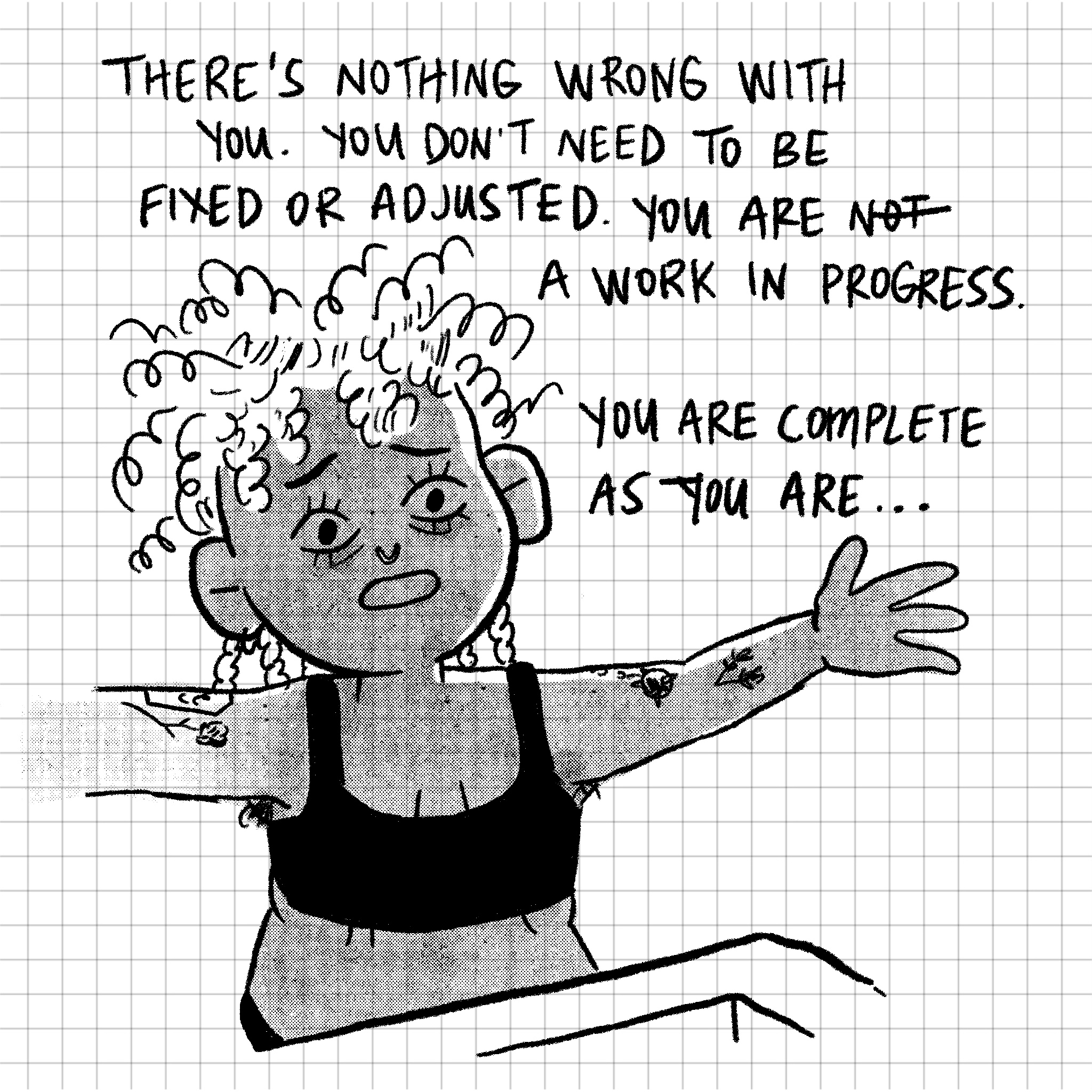 Morning Rumination on Instagram
Morning Rumination on Instagram
Bianca Xunise: Being an artist with disability and sharing that in my characters and the work that I put out there, because you're already Black, you're already queer. I was socialized as a woman, even though now I go by nonbinary, but I still existed under that societal pressure of being marginalized. And it's like then you want to also give them something, like oh, also I have this disability. It's just like the world that we live under treats everything that you are as sort of an inconvenience, and this program was like we're actually really excited about you and your differences and we want to make those shine and we want you to not be afraid of it or not to have to feel ashamed. Just having that in this program for three months, people just being like I'm not asking more of you, I'm just here and how can I support you just being you. That's what I really, that's what I got out of it you know. The book's done, that's really exciting. Just that communal part, especially post 2020. I crave community.
Stephanie Alma: What is the name of your book?
Bianca Xunise: My book is called Punk Rock Karaoke.
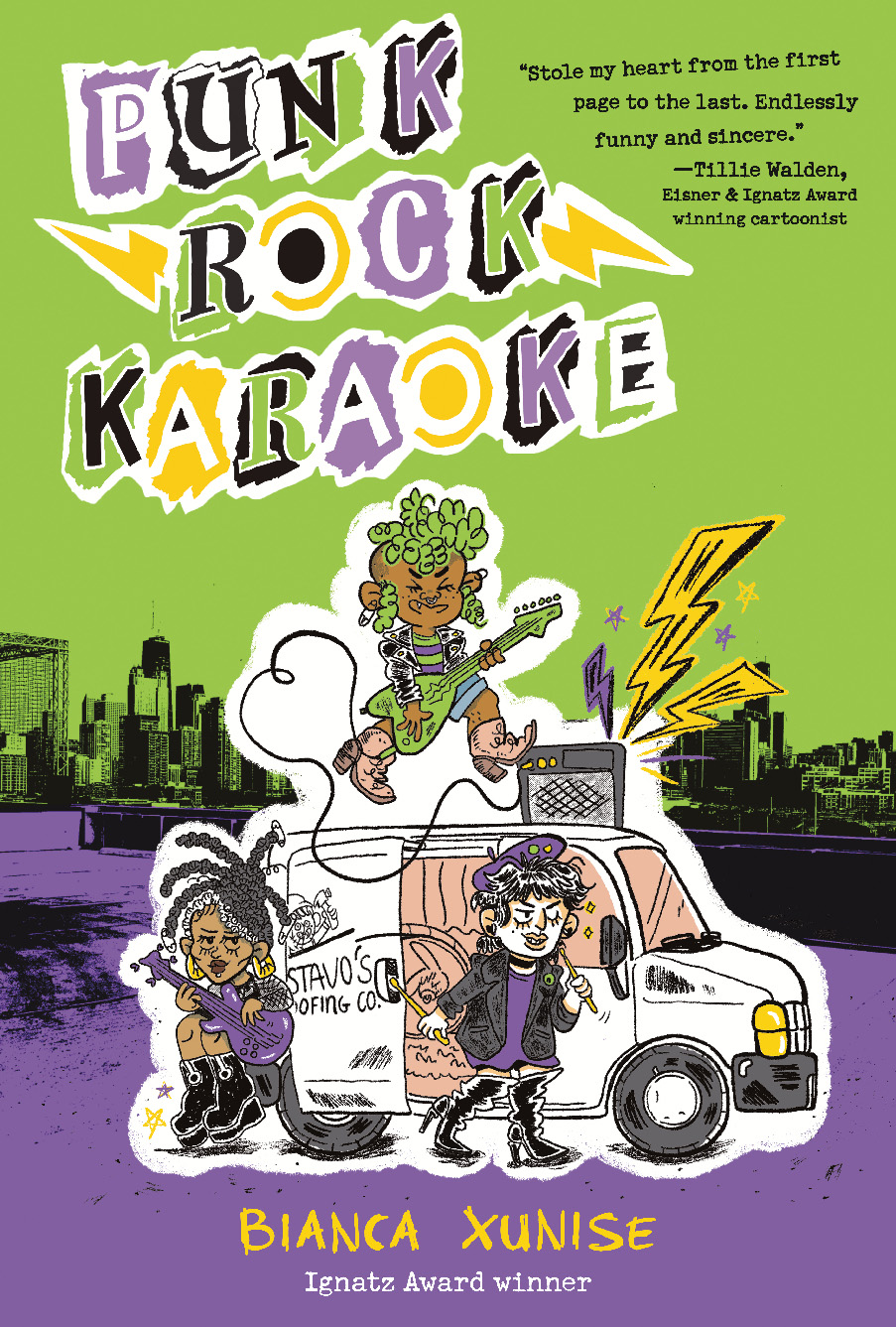 Punk Rock Karaoke
Punk Rock Karaoke
Bianca Xunise: I am curious in how, you know, we all work in these narratives. You write music and I saw that you do photography and illustration and just like how you combine, like use your work as a narrative?
Stephanie Alma: For me the inspiration comes out of nowhere, and it's ideas that are subtle that you think like, oh that was just a passing idea, but I decided that I would do this with a cellist. And at that time when I was out of words and didn't know exactly what to say about what I was living through, I allowed myself to do more, it's called "Silky Syllables and Cello" so it's literally whatever sounds I had felt and were feeling at that moment, I let that go out and I let with this cellist like we created such a beautiful like comfortable space that it did happen and it came out.
Stephanie Alma: I love this and I love going back to it because now learning about Cripistemology and how there is this wisdom that we share as people with disabilities, I try to go back to that and listen and see: what was I saying, is there something that I was saying here? And there are no words, so it's not like literally what it was, but that sound, and I'm hoping that that feeling that there is a feeling and that there is something there that other disabled people connect to as well.
Bianca Xunise: That's really interesting about what you said about, you created this piece that, um, there's no words to it, but what were you saying, and sometimes creating something out of just the need to create and then realizing like the hidden message you put in something that you didn't even realize you were putting in it when you were creating it but then you see it in the future. And you're like, well that's way deeper than like even what I intended. Like I'll even go back and read some of my work and be like, oh woah, I just was mad that day, and so I just poured it out and then you can sort of unpack it and look at it again, you're like, it informs yourself it feels like at this higher thing, yeah.
Reveca Torres: You all are going right into my next question. So one of these opportunities in the residency program was to help artists learn learn about, expand, or contribute to the idea of disability aesthetics. What form did that take for you and how do you situate your own work in disability aesthetics?
Stephanie Alma: When I started this, I started with the question of what does disability sound like and that's kind of what's driven most of my work. And, it sounds like so many things, so many different projects, that like even now that I'm working with a more kind of alternative rock Spanish band, disability sounds different there. That album that I put out, it's called De Tu Miedo Aprendi, so "From Your Fear I Learned." Like, there was a lot of anger there and there was a lot of staring back. And there was a lot of, like, if you hear this and you feel uncomfortable, that's what was intended because in finally returning everything that's been just shoved at me. It's like, well where do I put this, and I'm giving it back now, you know, and letting it go. And so in that case, yeah that's driven most of my work to see all the different sounds of disability and what it could be.
Reveca Torres: What form does that take on for you?
Bianca Xunise: We did a live comics reading as visual artists, and working in comics medium it goes beyond just language. Like, you know, a really good comic you should be able to understand even without the text being there. But that's still only catering to you know being the visual part of it, like how can we even go beyond what we can see and reach out to other disability groups, like people who are visually impaired or even sign language, all of these things, and how can I bring that?
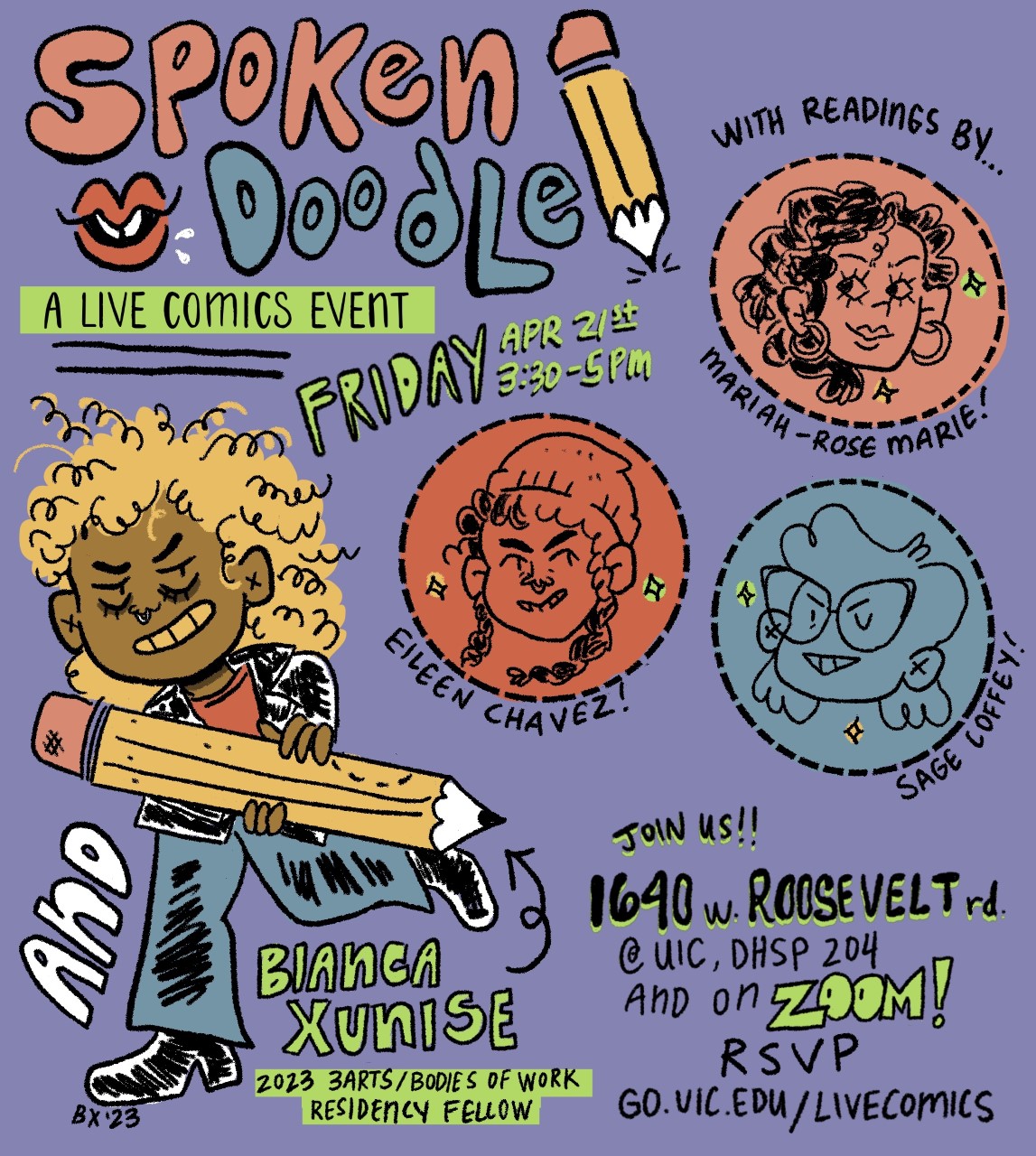 Spoken Doodle Flyer
Spoken Doodle Flyer
Stephanie Alma: You see, I feel like as artists, we have that pressure. Especially if we're disabled, people expect that our work should be accessible, like entirely, unlike other artists, who don't have that pressure behind them. But we do. Now that I'm looking at it, we each are telling a specific part of the story. And I feel like when you combine all our art together, that is the big accessible piece that we've been looking for, rather than how do I as one person do all of this. You know?
Reveca Torres: So what does that mean to you then to be part of the Chicago disability arts community?
Stephanie Alma: It's exciting, it's exciting seeing what ideas that have been maybe pushed aside or hidden in a way are finally coming out, and to meet more people that think similar to you. It's like, it's a whole new life, yeah.
Bianca Xunise: Just to see other avenues and other types of people being represented in work, even just us here, all as people of color, like that's really cool. And one thing about this program, is it doesn't feel tokenized. When you enter other spaces that, there's no umbrella, you kind of feel like you might just be the token one. Like did you really like my art or did you really like that I check these boxes for you? And in this program, it's like, oh I got chosen for my art and not because of this other thing you know, and it made me feel more confident in myself as an artist and confident in saying that I'm an artist with a disability.
Stephanie Alma: I have a visual impairment, I'm legally blind so when you're mainly in a sighted space or with sighted people it's so important to first get to know me or like love me as a human being, and then I can talk to you about the disability component and all of that. But it's very vulnerable. But you have to balance that with also that there is a disability pride that I feel from my identity, so that's why I am open to explaining.
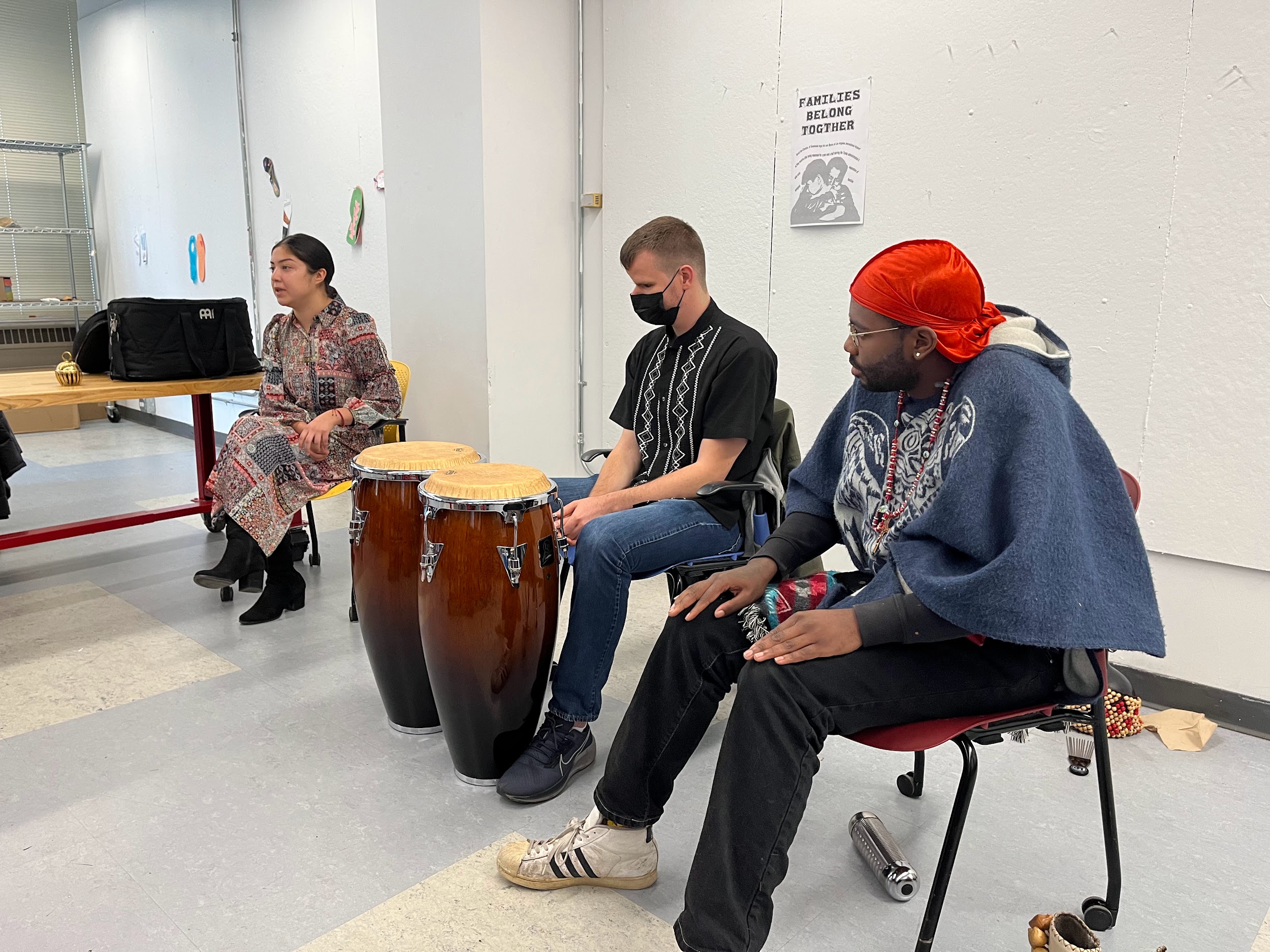 Classroom Workshop
Classroom Workshop
Reveca Torres: I love hearing the pride and the confidence that has come out for you being part of the disability community, that's great. What about challenges, have you faced challenges in gaining access or funding or training within the arts field?
Stephanie Alma: Everything is online. I'm not extremely great with my screen reader yet, and my visual impairment is progressive, so a lot of the things I am learning over time. It's a little bit different for me yeah and then when you bring on discrimination and these days more like covert, that's another challenge that you have to navigate.
Bianca Xunise: One that I faced recently was earlier this summer, there was a zine comics festival, and it changed locations from where it used to be. The problem with this place was that the fluorescent lighting, had like a "eeeee" to it and and it was flickering so for me, having a seizure disorder, I was like well this is just a taking time bomb for me. I ended up giving my table away, and it's like one of my best shows, and so then I also took a financial hit from it because I couldn't bear to be in there anymore. Yeah, just in the art world, it sucks, because you expect it's almost like you expect better from us when it's in the art realm, than like outside the art crew, and it's the cool, cold world of corporate capitalism you expect it, but when it's us, it's just like oh, let's do better.
Reveca Torres: Yeah, for sure, especially you know like what you said a lot of the content being, you know, very close to topics about disability, so that's interesting. So what is next now, what are you dreaming of for your own practice and for the disability arts movement?
Stephanie Alma: Just physical spaces and venues is next. So now that like I have the art, I have something to present, and how to find more accessible spaces to present, that's the next step.
Bianca Xunise: I'm in this space, this mindset now where I kind of just want to be more unapologetic about who I am. You know, if I'm at a show and there's a strobe, I'm going to be like, hey this is actually quite harmful. And I want to bring, converge, you know, the disability scene with the punk scene and the art scene and just how can we...
Stephanie Alma: Oh definitely, we are the punk scene!
Bianca Xunise: Exactly, how can we all do better? And how can we keep each other accountable that it's not just, doesn't just fall on one of us but that we can build community and shake things up and want just to be able to leave our homes and feel comfortable and, like what a, what a concept.
Reveca Torres: Well, thank you both. I look forward to seeing your work evolve and continue and thank you for the conversation today.
 Classroom Presentation
Classroom PresentationThe Disability Culture Leadership Initiative and 3Arts/Bodies of Work Residency Program are supported in part by grants from
the Joyce Foundation and the National Endowment for the Arts.
